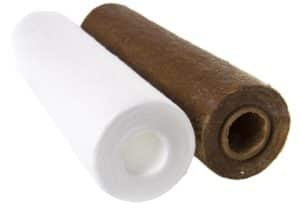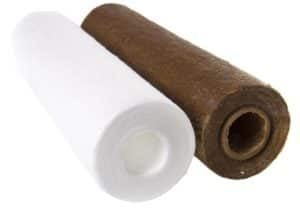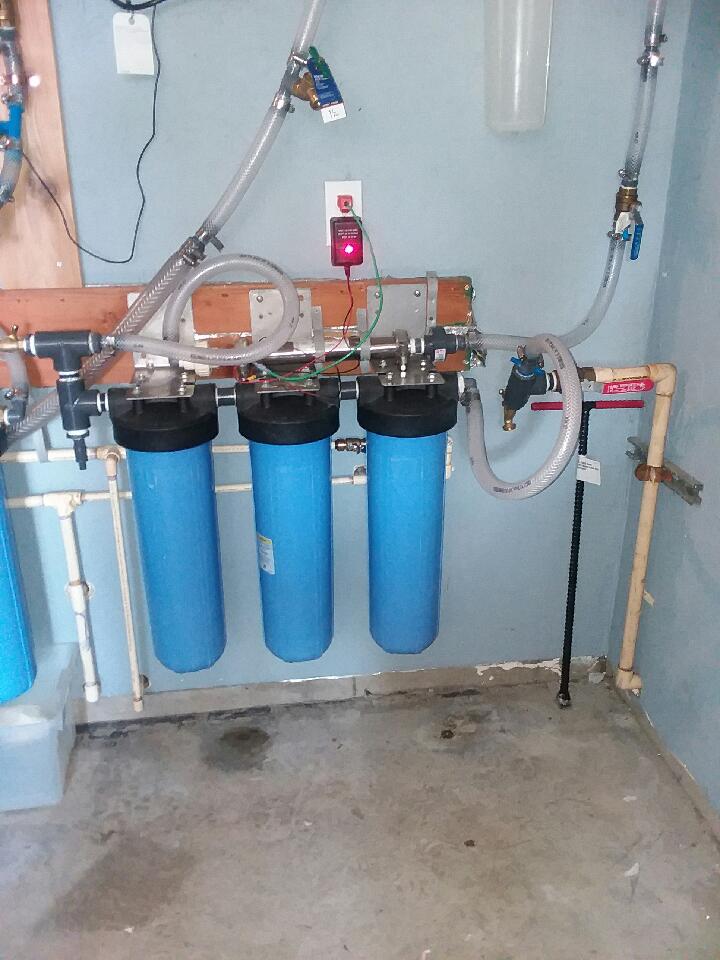How to Select a Filter Cartridge for Whole House Sediment Removal


File Under Filter Media
How to Select a Water Filter Cartridge for Whole House Sediment Removal


Cartridge filters are affordable, easy to install, require no electricity, and produce no wastewater. They’re also simple to replace—and some pleated types can be cleaned and reused.
Over time, sediment can clog the filter, reducing water pressure. To manage this, filters are often installed in series, starting with a larger micron size and progressing to smaller sizes (down to 1 micron).
Cartridge filters generally come in two types: surface filters and depth filters, each suited for different filtration needs. Regular water filter replacement is crucial to maintaining water quality and system performance.
Understanding Your Water Filter Needs
Before choosing a replacement water filter, it’s essential to understand your specific water filtration needs. Start by identifying the types of contaminants present in your water supply, such as sediment, chlorine, bacteria, and other impurities. Knowing what you need to filter out will help you select the most effective water filter for your home.
Next, consider your water filtration system's flow rate and pressure requirements. Different systems have varying demands, and choosing a filter that matches these requirements ensures optimal performance. Additionally, think about the size and type of filter cartridge you need, including the diameter and length, to ensure compatibility with your existing system.
Certification and compliance are also crucial factors. Look for water filters that meet standards set by organizations like NSF International or the Water Quality Association (WQA). These certifications ensure that the filter has been tested and proven to effectively remove contaminants.
Research the different types of water filters available, such as activated carbon, reverse osmosis, and ultraviolet (UV) filters. Each type has its strengths and is suited for different filtration needs. Reviewing reviews and consulting with experts can provide valuable insights and help you determine the best water filter for your situation.
Finally, a good water filter should provide clean and safe drinking water and be easy to install and maintain. Considering these factors will help you make an informed decision and ensure the long-term effectiveness of your water filtration system.
Surface (Pleated) Filter Cartridges
Surface filters trap particles on the outer layer of the pleated membrane, typically made from materials like polypropylene or nylon. These pleats create a large filtration area, allowing for higher flow and longer use.
Pleated cartridges can be washed and reused, making them a cost-effective option. They're often used as coarse pre-filters (30–500 microns) but can also filter down to 0.04 microns in specialized applications like pharmaceutical or semiconductor filtration.
Surface filters offer consistent performance without depth filtration because of their large surface area—up to 11 square feet in a standard 10″ x 2.5″ cartridge.
Depth Filter Cartridges
Depth filters are commonly seen as wound string, spun, or “melt-blown” cartridges that trap particles of larger size on the surface and smaller particles under the surface down to the center core.
They work best when a variety of particle sizes are being filtered. Depth filters remove more sediment and hold more sediment overall without losing pressure than a surface filter cartridge. Various types of filter cartridges are readily available in stock, ensuring that customers can find the right replacement when needed.
What Is a Micron Rating?
Micron ratings indicate the size of particles a filter can remove. For example, a 5-micron filter captures particles as small as 5 microns.
Filters are rated as either Nominal or Absolute:
- Nominal filters capture most (but not all) particles of a stated size.
- Absolute filters are lab-tested to block nearly all particles at a specific size.
Nominal ratings are common for general sediment removal, while a 1-micron absolute filter is recommended for removing parasites like Giardia—especially from surface water or wells influenced by surface water.
Which Type of Filter Cartridge is Best?
Which Type of Filter Cartridge is Best?
One advantage of whole-house filter housings is that you can experiment with different water filter cartridges to see what works best for your application.
Generally, we recommend pleated 50-micron filter cartridges followed by a dual grade 25/1 micron depth filter.
We recommend dual-grade depth filters for very fine sediment in the 1 to 5 microns range.
Dual-grade depth filters start at 50 on the outside and filter down to 5 microns on the inside, which is very effective over a wide range of sediment particles.
Dual-grade filter cartridges remove 2.3 times the amount of sediment that standard spun or string-wound filters remove.
For more information on removing sediment from your water, visit our Sediments page on our Water Problems tab.
If you still have questions, don’t hesitate to e-mail us at support@cleanwaterstore.com, leave us a message on Facebook, or use our online contact form for prompt, personalized assistance from our trained professionals. Thanks for reading!
Frequently Asked Questions (FAQs)
1. How often should I replace my cartridge filter?
This depends on your water quality and usage. Most sediment cartridge filters should be replaced every 3–6 months, but heavily used systems or those with very turbid water may need more frequent changes.
2. Can I clean and reuse a cartridge filter?
Yes, pleated surface filters are often washable and reusable. Depth filters, such as spun or melt-blown cartridges, are usually not reusable and should be replaced once clogged.
3. What’s the difference between a pleated and a depth filter cartridge?
Pleated filters trap contaminants on the surface and have a high surface area, while depth filters trap particles throughout the entire thickness of the filter material, making them better for water with varying particle sizes.
4. What micron size do I need for my sediment filter?
That depends on the type of sediment and your water clarity goals. A 5—to 25-micron filter is sufficient for general sediment, but for fine sediment or cysts like Giardia, a 1-micron absolute-rated filter is recommended.
5. Can I use multiple cartridge filters in a row?
Yes! Installing filters in series is common. Start with a coarser filter (e.g., 50 microns), followed by finer filters (e.g., 5 or 1 microns) to extend the life of the smaller micron filters and reduce clogging.
Recent Posts
Water Quality for Horses and Livestock: A Guide to Healthier Barns and Pastures
Clean water is the cornerstone of animal health and productivity. Whether you're raising horses, cattle,…
Clean Drinking Water for Cats: What Every Cat Owner Should Know
Why Clean Drinking Water Matters for Cats Hydration is critical to a cat’s overall health,…
Pet Hydration: What to Know About Water Safety
Clean Drinking Water for Dogs: What Every Dog Owner Should Know Clean drinking water is…
How to Ensure Fresh, Safe Water for Your Birds: Daily Care Tips for Bird Owners
Why Filtered Water for Birds Is Essential for Their Health Like food, clean drinking water…
U.S. Water Problems by Region: Common Contaminants & Solutions
Curious about U.S. water problems by region? Water quality isn’t just a national issue—it’s a…
Wildfire Water Contamination: How to Ensure Safe Water After a Fire
Wildfire Water Contamination: What You Need to Know After the Fires Drinking water contamination is…


